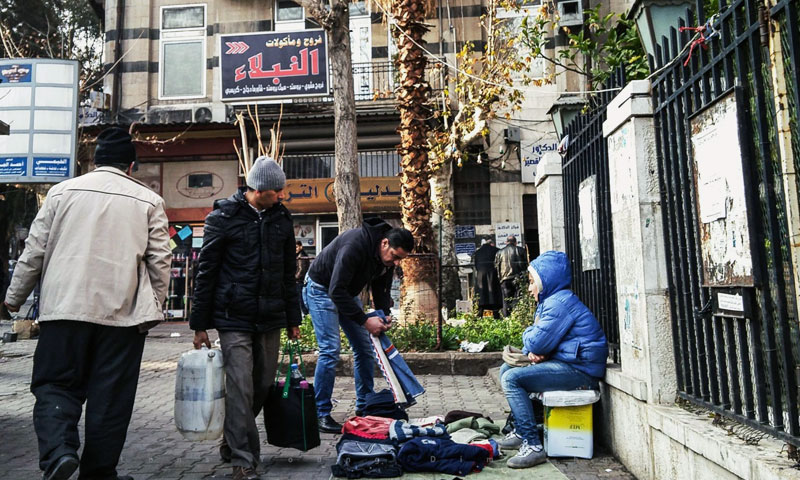



In the heart of the Syrian capital Damascus, there a street lies, the smell alone can guide you there, the distinct smell of old clothes to which preservatives and sterilizers are added in preparation to be sold, to whom? The target customer, here, is the poorer segment of the Damascene population.
The name of “al-Itfaayia” street, close to al-Baramkeh in central Damascus, has through time became a synonym to “baleh”, secondhand clothes. Despite being a residential neighborhood, once you hear that someone is heading to “al-Itfaayia”, a trail of images rushes within your mind of someone diving deep into piles of secondhand clothes, in search for the “chosen” piece.
The secondhand market in Syria, in the overcrowded Damascus city in particular, is one of the poor majority and middle class’ citizens favorite destinations, which incited their concern when the Ministry of Internal Trade and Consumer Protection passed a ruling on July 10, banning the import of secondhand clothes, to back it, only two days later, with a hasty decree that cancels the first ruling, thus allowing the import of secondhand clothes.
Syrian people think that the ban on secondhand clothes targets the poorer population, who are afraid that the ministry will cancel the latest ruling and impose the ban again. “The ministry must monitor other smuggled materials, such as alcohol and Turkish-made goods, instead of banning secondhand clothes on the pretext of consumer protection,” Mohamad Khalid, 46 years old unemployed man, said to Enab Baladi.
Activists expressed their objection to the ban, including Syrian actress Nussima Daher, who wrote a post on “Facebook” saying: “The secondhand clothes market is the place from where I bought most of my clothes; a number of merchants used to hide rare pieces for me. Today, the secondhand clothes will be made of the clothes that have been stolen from the Syrian people’s houses,” adding “boycott the looted clothes as they still have their owner’s sweat on, which will be burning you.”
In the past, the secondhand clothes market used to be the poor’s sanctuary; the place where they got clothes to keep themselves worm in winter and others to ward heat off in summer. Syrians with average incomes also had their own share of the market, not missing the chance to have its smell on their bodies, especially that the imported clothes had a way better quality than national brands.
In the past a few years, the market witnessed the rise of a new type of “baleh”, presenting the customers brand new clothes, on stalls that the poor could not dare to stand and watch, not to mention buying. Dealing in this type, the shops present leather shoes, the price of which is identical to those in the regular markets, confusing the buyers who cannot define whether the commodity is a secondhand or a brand.
The shops, featuring the new clothes, are located in the area of al-Tijarah, Damascus, in addition to the ones opened in the area behind the Palace of Justice, the customers of which are middle class and sometimes rich people. Samer, one of these shops’ owners who refused to reveal his full name for security reasons, said: “these people seek world-famous brands, in addition to their high quality, there are no similar pieces in the [local] market, a thing that usually women prefer, able to recognize the difference, for these clothes are new, not used and are sold for lesser prices than their likes.”
According to a report by the United Nations Office for the Coordination of Humanitarian Affairs (OCHA), late in 2017, 69% of the Syrian population is impoverished and the majority of the people in the most affected local communities has exhausted its ability at adaptation.
Concerning the prices of the new clothes, Samer said: “the price of a sweater in the local market varies between 300 to 7 thousand Syrian pounds (the equivalent to $18) while the price of better quality sweater, international brand, varies between a thousand and 1500 Syrian pounds (the equivalent to three dollars).”
Samer believes that the secondhand clothes markets, despite the price discrepancy between stalls and shops, is way cheaper than the local market, especially during the war years, due to the deterioration that afflicted many Syrian people’s lives, following the devaluation of the Syrian currency in front of the U.S. dollar, 45 to 500 Syrian pounds per dollar.
Marwan, 38 years old, a public-sector employee, affirmed Samer’s statement, said: “secondhand clothes deserve being thanked, for when the prices of clothes rose in correspondence with the decrease of the monthly income, used clothes became the poor people’s weapon in the face of the high cost of living, for they are less costly and of high quality. The price of a new jacket is 35 thousand Syrian pounds, while it does not exceed the five thousand Syrian pounds in the secondhand market.”
Importing second hand clothes is banned in Syria under official decrees; nonetheless, the profession proliferated on a limited scale depending on smuggled products and became even more famous after 2011.
Second hand clothes are usually smuggled to Syria through Lebanon or the Damascus International Airport to the areas under the control of the Syrian regime, while they are being imported through Turkey to the areas held by the opposition.
if you think the article contain wrong information or you have additional details Send Correction